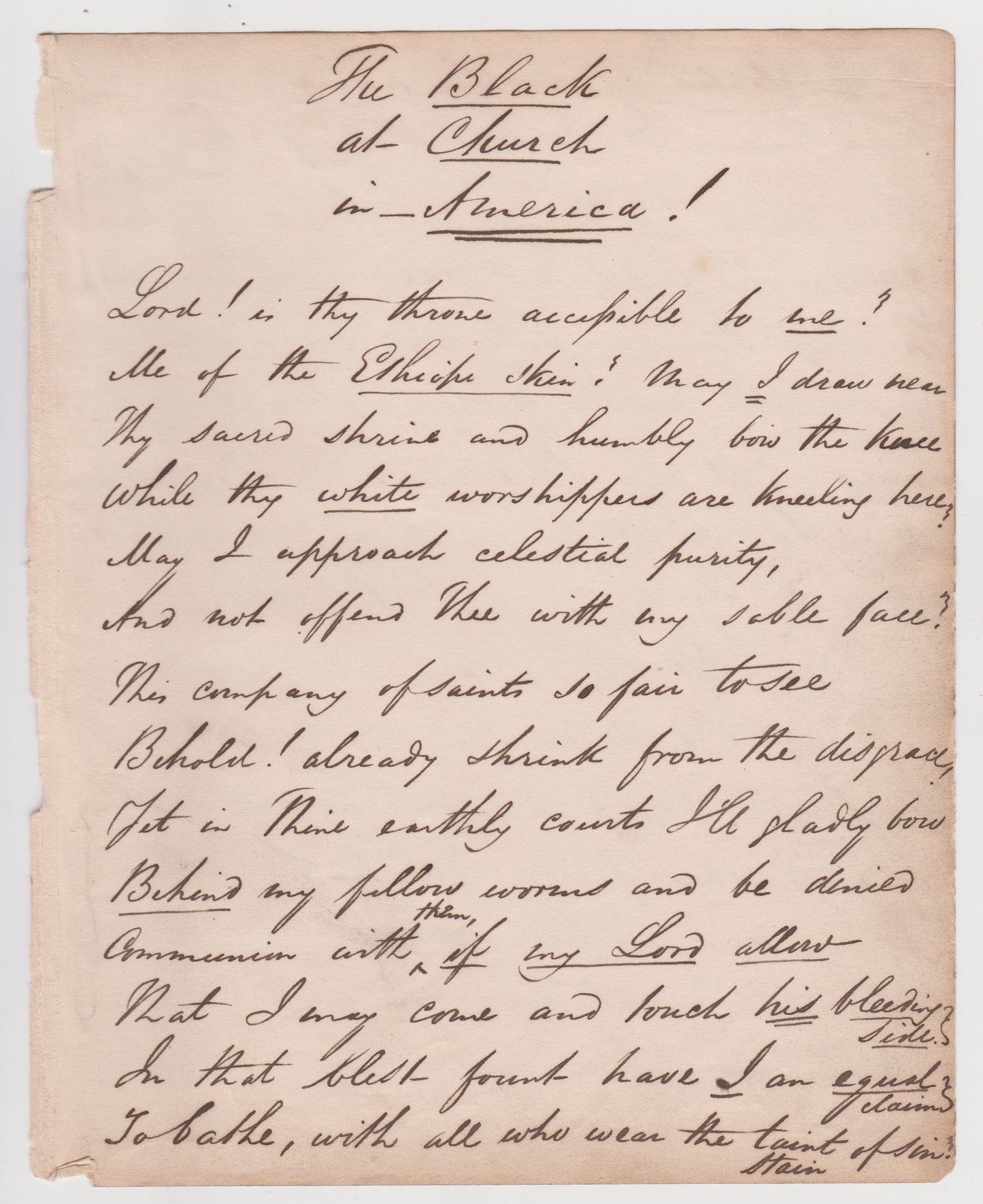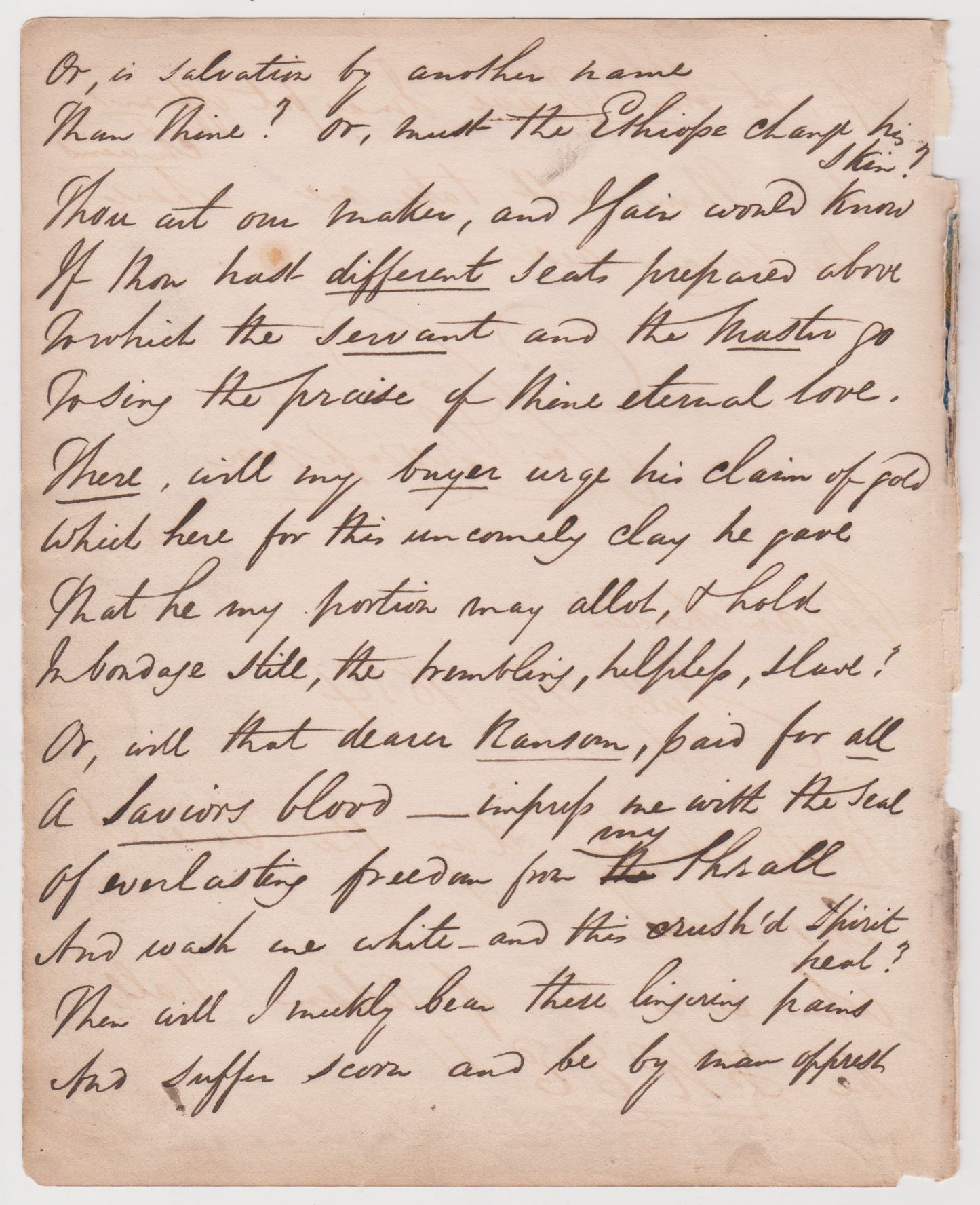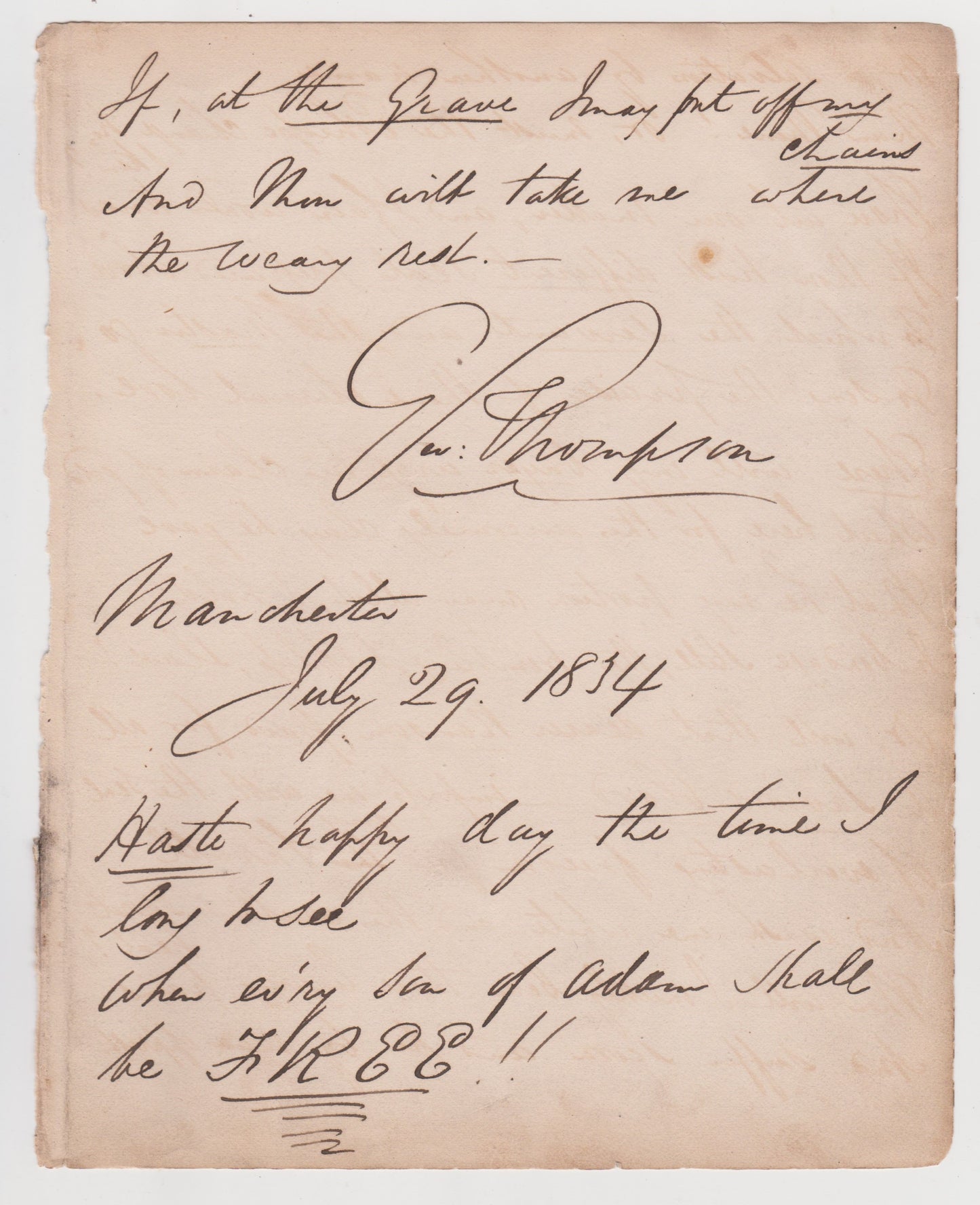Specs Fine Books
1834 GEORGE THOMPSON. Important Abolitionist Poem that Led to His Attempted Murder in America!
1834 GEORGE THOMPSON. Important Abolitionist Poem that Led to His Attempted Murder in America!
Couldn't load pickup availability
An absolutely fantastic, unpublished poem written by noted abolitionist, George Thompson. It is a red-hot, earnest rebuke of America and her complicity in slavery. Similar to Whittier's work, it challenges the American Christian with a series of questions designed to demand that the black slave is loved by Christ and is therefore worthy of equal treatment.
It was penned in 1834, the year of Thompson's first visit to the United States. It may well have been the poem, when read to audiences, that caused the storied multiple attempts to be made on his life.
It appears to be unpublished in any form! This is his original, beautifully preserved manuscript.
George Donisthorpe Thompson (18 June 1804 – 7 October 1878) was a British anti-slavery orator and propagandist who labored both as a speaker and as a legislator tirelessly for the abolition of the slave trade. He had the unique distinction of being one of the most influential voices for abolitionist in both the United Kingdom and the United States.
Thompson’s father worked aboard a slave trading vessel, and his stories of the horrors of the slave trade planted the issue in the younger Thompson's mind from an early age. He recalls the stories his father told in some of his later writings; they felt as fresh from his aged pen as when he first heard them.
He was hired by the society to try to get slavery immediately abolished on moral and religious grounds, a concept called "immediatism." He quickly took up the dissemination of the Society's creed: "To uphold slavery is a crime before God, and the condition must, therefore, be immediately abolished." In 1832 he travelled to Scotland, where he gained an interest in the abolition of slavery in the United States and other parts of the world. While in Scotland he also met William Lloyd Garrison, who would remain a lifelong friend and colleague, as well as Nathaniel Paul, an African-American abolitionist. In Glasgow in 1833 he debated with Peter Borthwick, who had been appointed by the West India Association to defend slavery.
Thompson was invited by Garrison to visit New England, and this proposal was not only accepted by his supporters in Glasgow but the Edinburgh Emancipation Society was formed so that it too could back Thompson's journey. From 1836 to 1847 he was active in every major anti-slavery debate in Britain, including the 1840 World Anti-Slavery Convention in London.
Thompson was one of the most demanding of the abolitionists as well, often protesting legislation that offered limited or gradual restriction on slavery. He demanded a quick and decisive emancipation of all slaves, unconditionally. He was ultimately unsatisfied with the British Emancipation Act of 1833, because it forced slaves to work as apprentices for six years after their "liberation."
While in America, and from abroad, he was scathing in his criticism of America and their role in the perpetuation of slavery. So vocal and uncompromising a voice would not be ignored, and while in the United States in 1834, he barely escaped being captured by pro-slavery forces after one of his lecturing sessions. His lecture circuit that year was credited with the formation of over 150 anti-slavery societies and inspired many to join the anti-slavery cause. The resistance to his platform did not abate, and he was forced to return to Britain for fear of “the assassin's knife". Attempts were made on his life multiple times while in the United States. The present manuscript may well be an example of why.
When the Fugitive Slave Law was passed in 1850, Thompson returned to the United States, and he was this time quite popular among proponents of abolitionism, now that the movement had increased in size and influence.
During a final visit in 1864, he met Abraham Lincoln, and both supported and witnessed the final destruction of the Confederacy at Fort Sumter in 1865.
He was friends with Frederick Douglass and hosted him when he traveled to Great Britain and Ireland.
It reads as follows:
"The Black Church in America
Lord! Is thy throne accessible to me?
Me of the Ethiopi skin! May I draw near
Thy sacred shrine and humbly bow the knee?
While thy white worshippers are kneeling here?
May I approach celestial purity
And not offend thee with my sable face?
This company of saints so fair to see
Behold! I already shrink from the disgrace
Yet in thine earthly courts I'll gladly bow
Behind my fellow worms and be denied
Communion with them, if my Lord allow
That I may come and touch His bleeding side.
In that blest fount have I an equal claim
To bathe with all who wear the taint of sin's stain
Or, is salvation by another name than thine
Or must the Ethiopi change his skin
Thou art our maker, and I fain would know
If Thou hast different seats prepared above
To which the servant and the master go
To sing the praise of thine eternal love
There, will my buyer urge his claim of gold
Which here for this uncomely clay he gave
That he my portion my allot and hold
In bondage still, the trembling, helpless slave
Or will that dearer ransom paid for all
A Saviour's blood, impress me with His seal
Of everlasting freedom for my thrall
And wash me white and this crushed spirit heal
Then will I meekly bear these lingering pains
And suffer scorn and be by man oppressed
If at the grave I may put off my chains
And thou wilt take me where the weary rest
Geo Thompson
Manchester.
July 29, 1834
Haste happy time, the day I long to see
When ev'ry son of Adam shall be FREE!!"
Three pages in a very good state as shown.
Share






